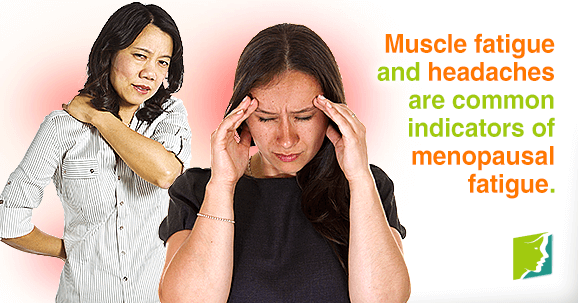Fatigue affects up to 80% of women at some point in their life, making it one of the most commonly reported symptoms in menopausal women. Fatigue refers to the persistent and ongoing feeling of tiredness, exhaustion, and weakness. Hormonal fluctuations are the primary cause of fatigue in menopausal women. Estrogen and progesterone, two of the major hormones in flux during menopause, help the body feel tired and maintain a regular sleep cycle. When these hormone levels decrease, its more difficult to get proper sleep. This article features things to keep an eye out for if you are suffering from menopausal fatigue.
Indicators of Fatigue
Fatigue may be hard to diagnose, but it includes a number of symptoms that the majority of sufferers experience to some degree. The most common indicators are:
- Drowsiness
- Weakness
- Muscle fatigue
- Apathy
- Irritability
- Memory lapses
- Dizziness
- Decreased attention span
- Headaches
- Blurred vision
- Loss of appetite
- Loss of motivation
Treatments for Fatigue
Treatments for menopausal fatigue typically involve making lifestyle changes to manage the symptom while simultaneously relieving other menopause symptoms and increasing overall health.
Exercise
Although exercising seems like the last thing you want to do when you are tired, it can really help in the long run. Exercise significantly increases energy levels, and also helps you get a good night's rest. Swimming, biking, and walking are all low-impact forms of exercising that are beneficial for fighting fatigue, reducing stress, improving mood, and improving efficiency of the heart, muscles, and joints.
Eat healthy
Avoid processed foods that are high in fat and sodium, as well as refined carbohydrates. These are all fatigue triggers that do not provide substantial nutrients. Apples, nuts, and whole grains are all energy-boosting, healthy snacks that help prevent fatigue.
Reduce stress
Taking walks, doing yoga, reading, taking a bath, and listening to soothing music are all things that can help reduce stress and fight fatigue.
Herbal remedies
Some herbal teas have been known to help boost energy levels. Ginseng is widely used for its many therapeutic benefits, like improving concentration and increasing energy levels.
Get adequate sleep
This seems like a no-brainer, but many do not get sufficient amount of sleep every night. Getting enough sleep is crucial to feeling good and maintaining high energy levels throughout the day. The general recommendation for adults is about eight hours of sleep per night.
Fatigue is a common complaint among menopausal women, as well as the population in general. Around 20% of Americans report having fatigue severe enough to interfere with their daily lives. Fatigue in menopausal women is primarily caused by hormonal fluctuations, and can range from mild to severe. Fatigue is often accompanied by other bothersome symptoms like headaches and irritability. Helpful ways to prevent fatigue include exercising regularly and maintaining a healthy diet.
Sources
- National Health Service UK. (2014). Menopause. Retrieved August 11, 2014, from http://www.nhs.uk/conditions/menopause/pages/introduction.aspx
- National Health Service UK. (2013). Why am I tired all the time? Retrieved August 11, 2014, from http://www.nhs.uk/Livewell/tiredness-and-fatigue/Pages/why-am-I-tired.aspx
- University of Maryland Medical Center. (2011). Fatigue. Retrieved August 11, 2014, from http://www.umgcc.org/patient_info/62811causes-of-fatigue-in-cancer-patients.htm




